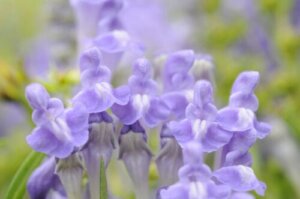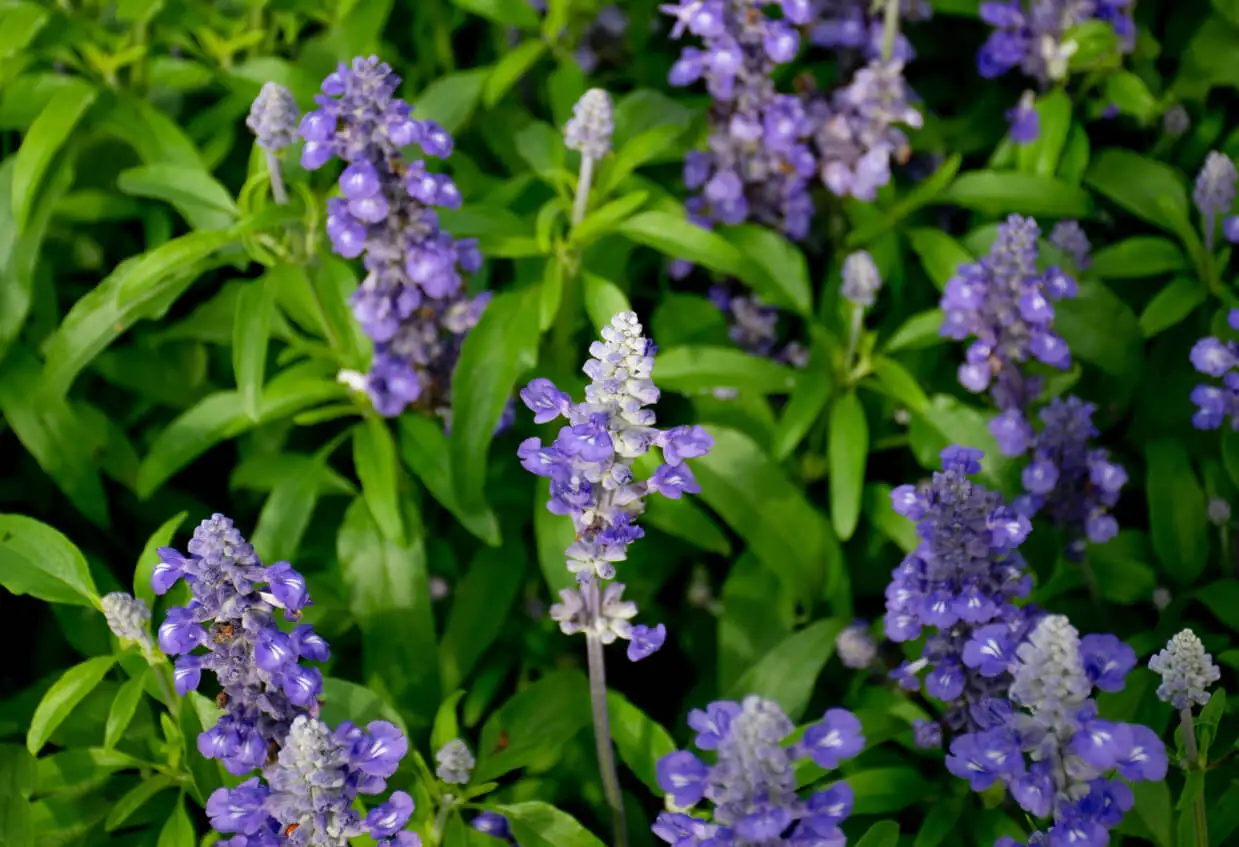Chinese Skullcap: Uses and Benefits


Reviewed and approved by the pharmacist Franciele Rohor de Souza
Chinese skullcap (Scutellaria baicalensis) is an herb that belongs to the Lamiaceae family, the same family that mint belongs to. It’s also known as “huang qin” or “baical skullcap” and has a long history as a remedy in traditional Chinese medicine.
In particular, this plant is noted for its high concentration of antioxidants, including flavones. It has two active substances, called baicalin and baicalein, which have been associated with various positive health effects. Are you interested in learning more about its uses and benefits? Read on!
Chinese skullcap composition and properties
In traditional Chinese medicine, skullcap roots are used in a traditional remedy called Huang-qin. A publication in Science Bulletin details that the Chinese have used this part of the plant for more than 2000 years for the preparation of various remedies.
It’s generally used in decoctions or tinctures, as it’s said to retain much of its properties. To be more precise, it concentrates a wide variety of phytochemicals, among which flavones (baicalin and wogonoside) and aglycones (baicalein and wogonin) stand out.
This composition is associated with antibacterial, antiviral, antitumor, hepatoprotective, anti-inflammatory, and antioxidant effects. Therefore, the plant and its derivatives are used for the treatment of diarrhea, bleeding, inflammatory disorders, and respiratory infections.
We think you may also enjoy reading this article: Five Medicinal Plants to Manage the Pain of Rheumatoid Arthritis
The uses and benefits of Chinese skullcap
In the traditional Chinese medicine system, the uses of skullcap are largely supported by anecdotal evidence. To this day, few clinical trials have evaluated the pharmacological potential that the plant has.
Preliminary studies suggest that this herb may be an adjuvant in the case of certain diseases. However, given the lack of human research, its use should be merely adjunctive.
Respiratory infections
Chinese skullcap has been used as a natural remedy to promote relief from respiratory infections. Its antiviral and anti-inflammatory properties aid in the control of symptoms such as congestion, cough and shortness of breath.
In a randomized trial, reported in the Archives of Disease in Childhood, an herbal mixture known as shuang huang lian – containing Scutellaria baicalensis among its constituents – exhibited positive effects in the treatment of acute bronchitis in children.
The main effects were as follows:
- Relief of fever
- Reduction of cough
- Reduction of hospital stay
- Control of wheezing and chest signs

Neuroprotective potential
In China, skullcap is used as a remedy to stimulate memory and learning. Consumption of the plant and its derived supplements is associated with improved cognitive performance. However, for now, there are only animal studies.
Research in mice, shared by Neuroscience Letters, found that one of the antioxidants in Chinese skullcap, baicalein, has neuroprotective activity and decreases the risk of cognitive impairment and Parkinson’s disease. The researchers suggest the need for further studies.
Prostate health
The popular literature indicates that Chinese skullcap may reduce the risk of developing benign prostatic hyperplasia (BPH). In fact, the Chinese population consumes the herbal supplement and infusions of the plant as a preventive measure to care for the prostate.
Regarding this, a study in mice revealed by Journal of Ethnopharmacology found that Chinese skullcap root extract suppresses abnormal androgen events in prostate tissue, which prevents the occurrence of benign prostatic hyperplasia.
In turn, through the American Association of Cancer Research, it was reported that the plant also has antitumor potential against prostate cancer. However, this is an area that has been little researched.
Although used in traditional medicine, Chinese skullcap should not be a first-choice treatment for prostate diseases.
Mood
Skullcap is classified as a “nerve restorative” and sedative plant, as it helps to reduce nervousness, anxiety, stress, and depression. Baicalin, one of its main active compounds, is related to these effects.
Other possible uses of Chinese skullcap
Despite the lack of scientific studies, Chinese skullcap has many other applications in traditional medicine. There is insufficient evidence for the following uses:
- Arthritis
- Epilepsy
- Hepatitis
- Atherosclerosis
- Hepatic cirrhosis
Risks and contraindications
For most healthy adults, Chinese skullcap is safe and well-tolerated. It’s possible that it may cause drowsiness, although this usually occurs with high doses.
Excessive consumption may also lead to hepatotoxicity and pneumonitis. It is essential to respect the dosage suggested by the supplement manufacturer.
However, given the lack of studies on the safety of the plant, its intake should be avoided in the following exceptional cases:
- Hepatic lesions
- Pregnancy and lactation
- Previous diseases, such as diabetes and hypoglycemia
- Treatments with benzodiazepines, anticonvulsants, and medications for insomnia

Suggested presentations and dosages
Chinese skullcap is available in capsules, tea, extracts, and tinctures. There’s no accurate information on the appropriate dosage.
Therefore, it is essential to read the product label carefully. Often, the following is recommended:
- An infusion: 2 or 3 cups a day. It is prepared with 5 grams of the plant per 250 milliliters of water
- A tincture: 20 to 40 drops in 120 milliliters of water, 3 times a day
- Tablets or capsules: 2 per day (may vary according to the manufacturer)
Like this article? You may also like to read: Spinach, Carrots, and Lemon: A Medicinal Drink to Eliminate Toxins
What to remember about Chinese skullcap
Chinese skullcap is quite valued in traditional medicine for its anti-inflammatory, antiviral, antibacterial, and antioxidant potential. The consumption of the plant alone or in herbal supplements is used as an adjunct to improve mood, reduce respiratory infections and protect the prostate.
However, the lack of scientific studies limits its therapeutic use. For now, it should not be a first-choice treatment if there is a suspicion of disease. In fact, it’s recommended to use it with the supervision of a professional in traditional Chinese medicine to prevent any problems and ensure you use it correctly.
All cited sources were thoroughly reviewed by our team to ensure their quality, reliability, currency, and validity. The bibliography of this article was considered reliable and of academic or scientific accuracy.
- Bokelmann, J. M. (2022). Skullcap/Scullcap (Scutellaria baicalensis, Scutellaria lateriflora). In Medicinal Herbs in Primary Care (pp. 593–598). Elsevier. https://doi.org/10.1016/b978-0-323-84676-9.00070-2
- Bonham, M., Posakony, J., Coleman, I., Montgomery, B., Simon, J., & Nelson, P. S. (2005). Characterization of Chemical Constituents in Scutellaria baicalensis with Antiandrogenic and Growth-Inhibitory Activities toward Prostate Carcinoma. In Clinical Cancer Research (Vol. 11, Issue 10, pp. 3905–3914). American Association for Cancer Research (AACR). https://doi.org/10.1158/1078-0432.ccr-04-1974
- Cheng, Y., He, G., Mu, X., Zhang, T., Li, X., Hu, J., Xu, B., & Du, G. (2008). Neuroprotective effect of baicalein against MPTP neurotoxicity: Behavioral, biochemical and immunohistochemical profile. In Neuroscience Letters (Vol. 441, Issue 1, pp. 16–20). Elsevier BV. https://doi.org/10.1016/j.neulet.2008.05.116
- Jin, B.-R., Chung, K.-S., Kim, H.-J., & An, H.-J. (2019). Chinese Skullcap (Scutellaria baicalensis Georgi) inhibits inflammation and proliferation on benign prostatic hyperplasia in rats. In Journal of Ethnopharmacology (Vol. 235, pp. 481–488). Elsevier BV. https://doi.org/10.1016/j.jep.2019.01.039
- Kong, X. T., Fang, H. T., Jiang, G. Q., Zhai, S. Z., O’Connell, D. L., & Brewster, D. R. (1993). Treatment of acute bronchiolitis with Chinese herbs. In Archives of Disease in Childhood (Vol. 68, Issue 4, pp. 468–471). BMJ. https://doi.org/10.1136/adc.68.4.468
- Limanaqi F, Biagioni F, Busceti CL, Polzella M, Fabrizi C, Fornai F. Potential Antidepressant Effects of Scutellaria baicalensis, Hericium erinaceus and Rhodiola rosea. Antioxidants (Basel). 2020 Mar 12;9(3):234. doi: 10.3390/antiox9030234. PMID: 32178272; PMCID: PMC7139475.
- Zhao Q, Chen XY, Martin C. Scutellaria baicalensis, the golden herb from the garden of Chinese medicinal plants. Sci Bull (Beijing). 2016;61(18):1391-1398. doi: 10.1007/s11434-016-1136-5. Epub 2016 Jul 8. PMID: 27730005; PMCID: PMC5031759.
This text is provided for informational purposes only and does not replace consultation with a professional. If in doubt, consult your specialist.








